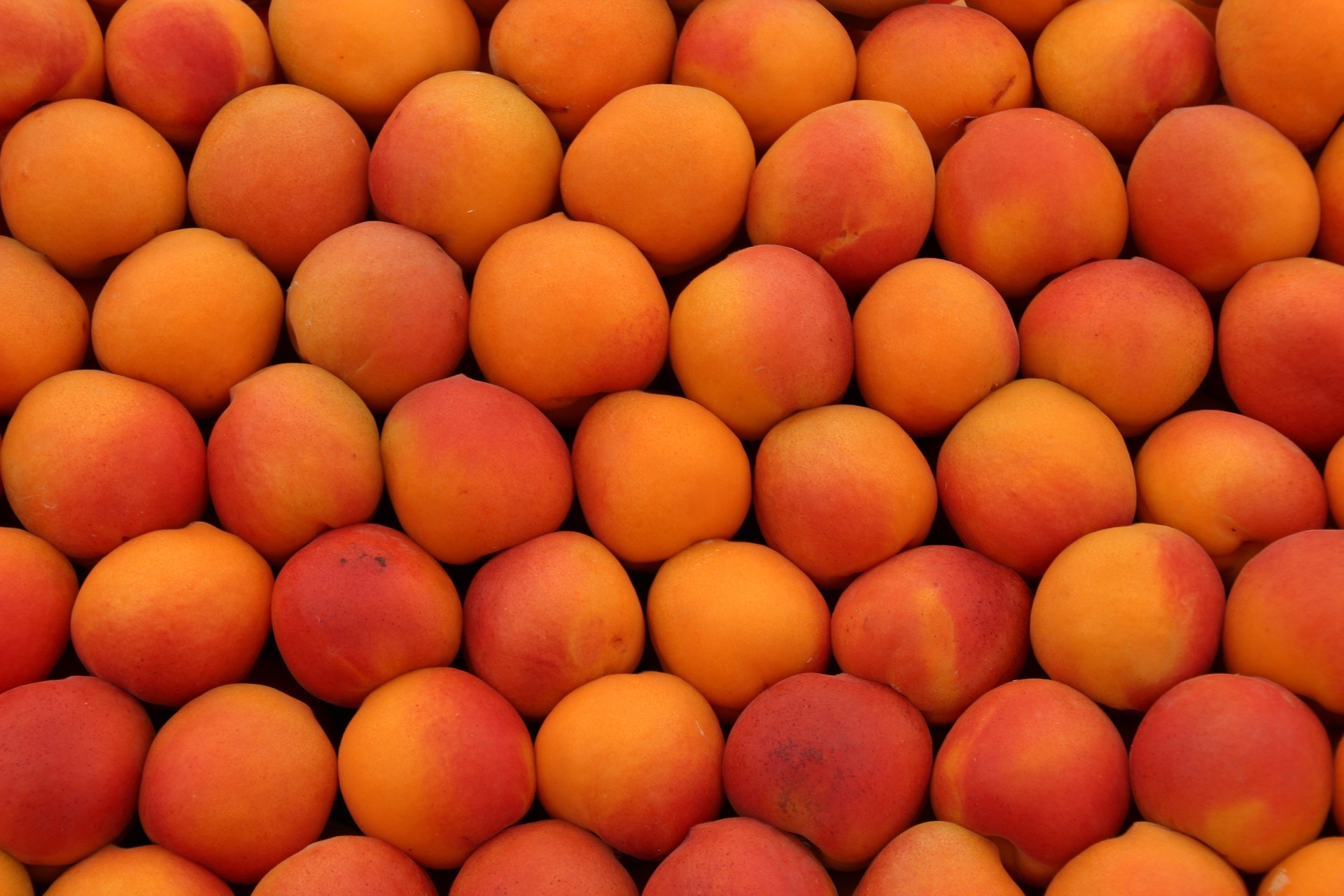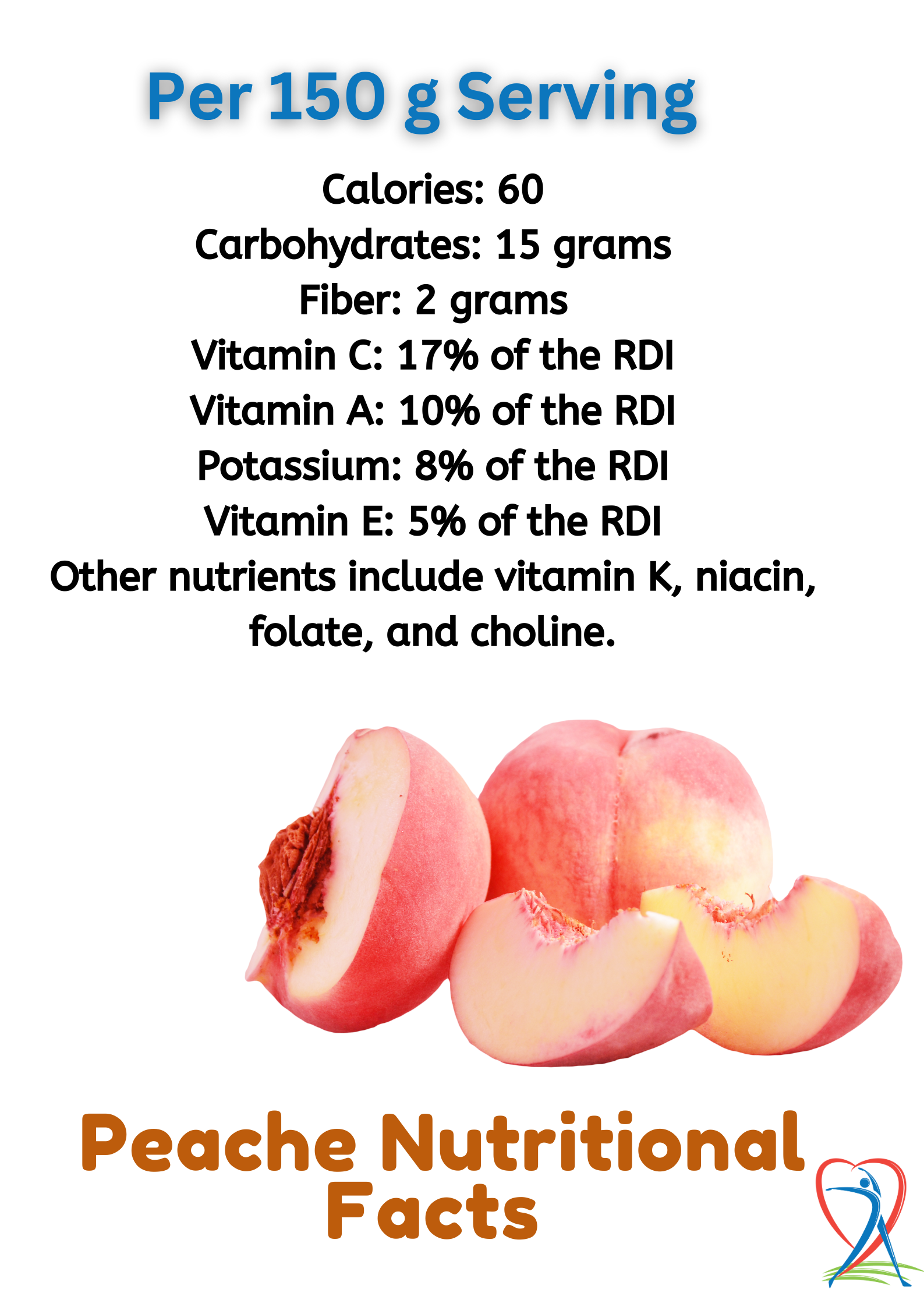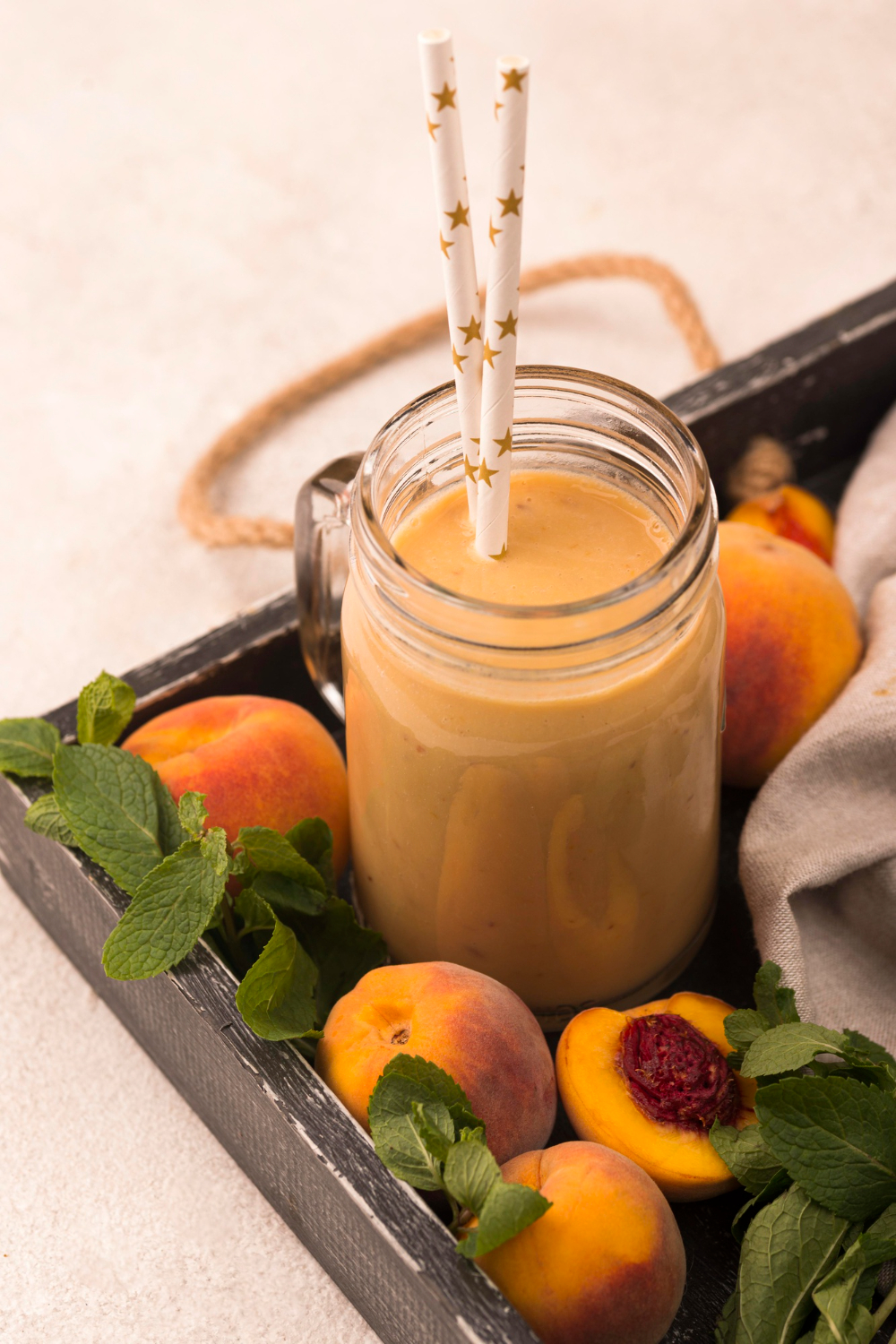Step into the enchanting world of peaches, where juicy sweetness meets a treasure trove of health benefits.
As summer's crown jewel, the peach reigns supreme, offering not just a delightful flavor experience but also a nutritional powerhouse waiting to be explored.
Join nutri4me on a journey through orchards laden with promise as we uncover the secrets of the peach – from its vibrant nutritional profile to its tantalizing culinary possibilities.
Nutritional Value
Peaches are low in calories but high in essential nutrients, making them a fantastic addition to any diet. A medium-sized peach (about 150 grams) contains approximately:
Calories: 60
Carbohydrates: 15 grams
Fiber: 2 grams
Vitamin C: 17% of the recommended daily intake (RDI)
Vitamin A: 10% of the RDI
Potassium: 8% of the RDI
Vitamin E: 5% of the RDI
Other nutrients include vitamin K, niacin, folate, and choline.
Peaches additionally contain lower levels of magnesium, phosphorus, iron, and certain B vitamins.
Peaches Health Benefits
Rich in Antioxidants
Fresh peaches are rich in antioxidants, which are beneficial plant compounds that fight oxidative damage and support the body in warding off aging and disease. The antioxidants are more concentrated in peaches that are fresher and riper.
In a research study, it was found that the juice from fresh peaches showed antioxidant effects in healthy men just half an hour after consumption.
Supports Digestive Health
Peaches have the potential to support proper digestion, a single medium-sized peach contains approximately 2 grams of fiber, with half of it being soluble fiber and the other half insoluble fiber.
The insoluble fiber in peaches aids in adding volume to your stool and facilitating the movement of food through your digestive system, thus decreasing the chances of experiencing constipation.
Conversely, the soluble fiber found in peaches serves as nourishment for beneficial bacteria residing in your intestines, these bacteria, in turn, produce short-chain fatty acids like acetate, propionate, and butyrate, which provide sustenance to the cells in your gut.
Boosts Immunity
The presence of vitamin A in peach juice is beneficial for enhancing overall immunity by increasing the number of white blood cells in the body.
Vitamin A also aids in regulating the body's endothelial cells, which are responsible for controlling blood clotting and immunity within the heart and blood vessels.
Moreover, vitamin C found in peach juice contributes to the body's immunity as a powerful antioxidant, vitamin C helps in reducing free radicals in the body, which are unstable molecules that can lead to various illnesses and diseases.
Additionally, vitamin C supports the creation of white blood cells and enhances their effectiveness in combating diseases..
Promotes Skin Health
Studies have shown that peaches contain compounds that can enhance the skin's moisture retention, leading to improved skin texture.
Additionally, research on animals and in test tubes has demonstrated that applying peach flower or flesh extracts directly to the skin may offer protection against UV damage.
Furthermore, peach flower extracts have been shown to delay the formation of skin tumors in mice. Nevertheless, further studies involving humans are necessary to draw definitive conclusions.
Supports Heart Health
Consistently consuming fruit, including peaches, has the potential to improve heart health.
Peaches have been found to decrease risk factors associated with heart disease, such as high blood pressure and elevated cholesterol levels.
Furthermore, research conducted in test tubes has demonstrated that peaches can attach themselves to bile acids, which are substances produced by the liver from cholesterol.
These bound bile acids, along with the cholesterol they contain, are eventually eliminated through feces, potentially aiding in the reduction of blood cholesterol levels.
Moreover, additional studies conducted on both test tubes and animals have revealed that peaches may have the ability to lower total cholesterol levels, as well as levels of "bad" LDL cholesterol, blood pressure, and triglycerides.
Peaches can help in the prevention of certain types of cancer
Due to the presence of beneficial plant compounds in their skin, flesh, and seeds. Carotenoids, caffeic acid, and polyphenols found in peaches have been shown to possess antioxidant properties that can inhibit the growth of cancer cells and tumors.
Studies have demonstrated that these compounds may limit the spreading of cancer cells and even have the potential to kill cancerous cells without harming healthy ones.
Peaches have the potential to alleviate allergy symptoms
When an allergen enters your body, it prompts the release of histamines, which are produced by your immune system to eliminate the allergen.
Histamines play a crucial role in your body's defense mechanism and can lead to allergy symptoms such as sneezing, itching, or coughing.
Studies indicate that peaches can potentially reduce allergy symptoms by inhibiting the release of histamines in the bloodstream.
Additionally, laboratory studies suggest that peach extracts may also be beneficial in reducing the inflammation associated with allergic reactions.
Nevertheless, further research is necessary to ascertain the extent of these effects on individuals with allergies.
How to Select the Ideal Peach
Evaluate the Texture
When it comes to selecting the perfect peach, the texture plays a crucial role. Gently apply pressure to the peach by squeezing it in the palm of your hand, it should yield slightly, indicating that it is ripe, avoid peaches that are too firm or overly mushy, as they may be underripe or overripe, respectively.
Examine the Color
A ripe peach should exhibit vibrant shades of yellow, orange, or red, depending on the variety, steer clear of peaches with green patches, as they are likely underripe and lacking in flavor. Instead, opt for fruits with consistent coloring and a healthy blush, as these are signs of optimal ripeness and sweetness.
Conduct the Sniff Test
Ah, the delightful aroma of a ripe peach is truly unmatched, bring the peach close to your nose and take a deep whiff. You should be greeted with a fragrant and sweet scent that entices the senses, if the peach lacks aroma or emits a sour smell, it may not be fully ripe or flavorful.
Consider the Stem
Inspect the stem end of the peach for any indications of decay or mold.
A fresh and ripe peach will have a clean and intact stem without any blemishes or soft spots, avoid peaches with bruising or discoloration around the stem, as these may suggest damage or deterioration.
Size Matters
While size does not necessarily determine the quality, it can provide insights into the peach's variety and ripeness.
Choose peaches that feel weighty for their size, as this typically indicates juiciness and ripeness, however, remember that smaller peaches can be equally as flavorful as their larger counterparts.
How to prepare a Healthy Peach Juice
Indulge in the goodness of a refreshing and nutritious Peach Juice, this delightful concoction combines the flavors of peaches, lemon, ginger, turmeric, and honey, providing a powerful boost to combat any cold.
Ingredients:
- 2 peaches, pits removed
- 1 lemon
- 2 inches of peeled ginger
- 1/2 inch of peeled turmeric
- 1 tbsp of honey
- 1/2 cup of water
Instructions:
Start by juicing the lemon, then place all the remaining ingredients into a blender and blend until smooth.
Recipe Notes:
While it is common to strain the juices through a fine mesh strainer, it is not necessary for this particular recipe. However, feel free to do so if desired.
For those who are new to turmeric and its potential staining effects, it is advisable to wear disposable gloves to avoid having yellow fingernails for days.




0 Comments